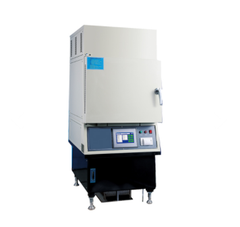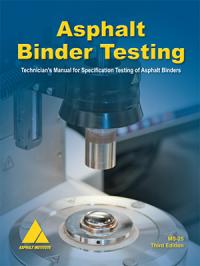Our price 6,681, Save Rs. Buy Ms-25 Asphalt Binder Testing: Technician's Manual For Specification Testing Of Asphalt Binders online, free home delivery. Asphalt binder testing is a key step to ensure proper mix design and hot mix asphalt production. Gilson has everything you need to perform design and QC/QA tests for viscosity, short and long. MS-25 Asphalt Binder Testing Manual Technician's Manual for Specification Testing of Asphalt Binders: Book. EPub eBook, $50.00. PDF eBook, $50.00.
This manual is a compilation of the information found in various other AI publications, including the Sp-1, MS-4, MS-5, MS-19, and MS-25 manuals. In addition, it includes information on topics such as, testing variability and resolution; generation of mastercurves; and the Multiple-Stress Creep Recovery (MSCR) test, previously unpublished. Chapter headings are as follows: Asphalt Chemistry; Asphalt Physical Properties and Characteristics; Asphalt Cements; Asphalt Emulsions and Cutbacks; Air-Blown Asphalt; Asphalt Modification; Safety; Understanding Testing Variability; and Supplemental Topics.
- Summary URL:
- https://mxo.asphaltinstitute.org/webapps/displayItem.htm?acctItemId=322
- Availability:
- Find a library where document is available. Order URL: https://mxo.asphaltinstitute.org/webapps/displayItem.htm?acctItemId=322
- Corporate Authors: 2696 Research Park Drive
Lexington, KY United States 40511-8480 - Publication Date: 2011
Language
- English
Media Info

- Media Type: Web
- Features: Figures; References;
- Pagination: 223p
Subject/Index Terms
Ms-25 Asphalt Binder Testing Manual
- TRT Terms: Asphalt; Asphalt cement; Asphalt emulsions; Bituminous binders; Chemical composition; Elastomer modified asphalt; Handbooks; Liquid asphalt; Materials tests; Physical properties; Polymer asphalt; Relaxation (Mechanics); Safety
- Uncontrolled Terms: Air blown asphalt
- Subject Areas: Highways; Materials; I31: Bituminous Binders and Materials;
Filing Info
- Accession Number: 01539640
- Record Type: Publication
- ISBN: 9781934154632
- Report/Paper Numbers: MS-26
- Files: TRIS
- Created Date: Jun 9 2014 2:51PM
Asphalt Binder Testing, continued
Because of this, binder testing is vital for HAS quality control, specification acceptance, and overall mixture evaluation.
Asphalt binder is the cement component of asphalt concrete that holds the aggregate together. The proper ratio must be used in order to ensure that the mix is the right consistency for its application. It creates flexibility within the construction process and high-grade asphalt solutions.

A variety of different binder tests are used depending on testing needs. With many applications, these tests are extremely versatile. Humboldt provides a wide-range of asphalt binder testing solutions to serve numerous test methods. These methods include:
Bending Beam Rheometer Testing works to measure low temperature flow properties of asphalt binders. These BBR machines indicate an asphalt binder’s ability to resist low temperature cracking by measuring stiffness within the mix.
Ms-25 Asphalt Binder Testing Manual Online
Distillation Testing is utilized to assess residue content in asphalts. These tests are used to check compliance with standards in projects as well as for mix design.


Ductility Testing determines asphalt binder ductility or ability to stretch without breaking. By using a ductilometer or ductility machine, these tests indicates how well the sample will elongate under traffic pressure.
Flash Point and Fire Point Testing are conducted to know the temperature at which an asphalt binder becomes vaporized into a flammable gas. It may also be used to determine when the asphalt flashes or spark. This parameter is established by a flash point tester and useful in determining asphalt’s volatility and fire resistance.
Penetration Testing provides precision penetration measurements and can be used with a variety of materials. It ultimately is an empirical way to measure asphalt consistency and classify them accordingly. Using a penetrometer, this test is able to assess the hardness of an asphalt binder.
Pressure Aging Vessel (PAV) Testing is utilized to test an asphalt binder’s physical property by stimulating long term age. In this test, asphalt binders are exposed to heat and pressure to artificially display aging over a 7 to 10-year period. mimicking real-life oxidation.
Rice Testing defines the theoretical maximum specific gravity of asphalt specimens. By removing air voids from an HMA sample, the specific gravity of the remaining aggregate and asphalt binder is tested.
Ms-25 Asphalt Binder Testing Manual Free
Rolling Thin Film Oven (RTFO) Testing is used to stimulate the STA processes of semi-soft asphalt binder coating on aggregates during mixing. This machine is employed to measure the effects that both heat and forced air have on binders during the mixing process and placement.
Softening Point Testing is primarily used as a consistency check for modified asphalt and involves the examination of mixes using a ring and ball method. This test works to quantify the temperature at which an asphalt binder achieves a specified degree of viscosity.
Ms-25 Asphalt Binder Testing Manual Online
Viscosity Testing of asphalt binders acts to evaluate its resistance to deformation. While this type of testing can take place in many forms including absolute viscosity, kinematic viscosity and rotational viscosity, it ensures that an asphalt mix will be capable of withstanding road conditions.
Viscometer and Rheometer Testing Viscometer and Rheometer Testing determine the flowability and viscosity of asphalt binders. In addition, these machines are also able to validate yield stress in a sample.